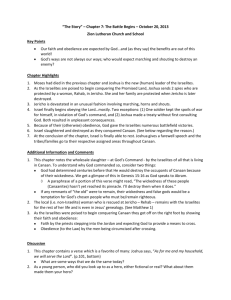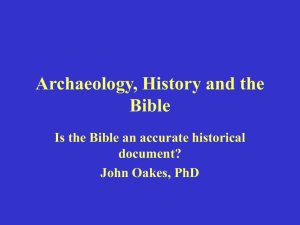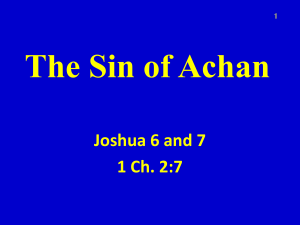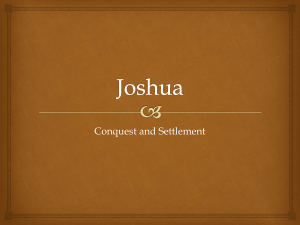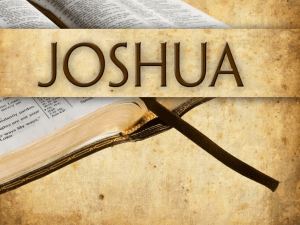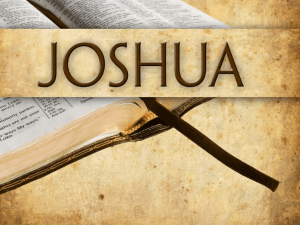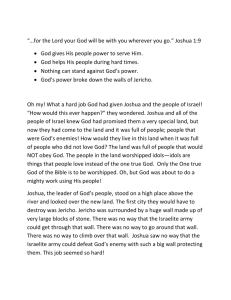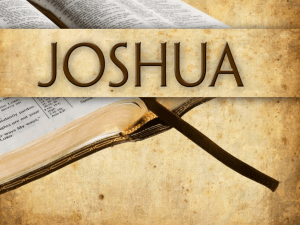Joshua - Clover
advertisement
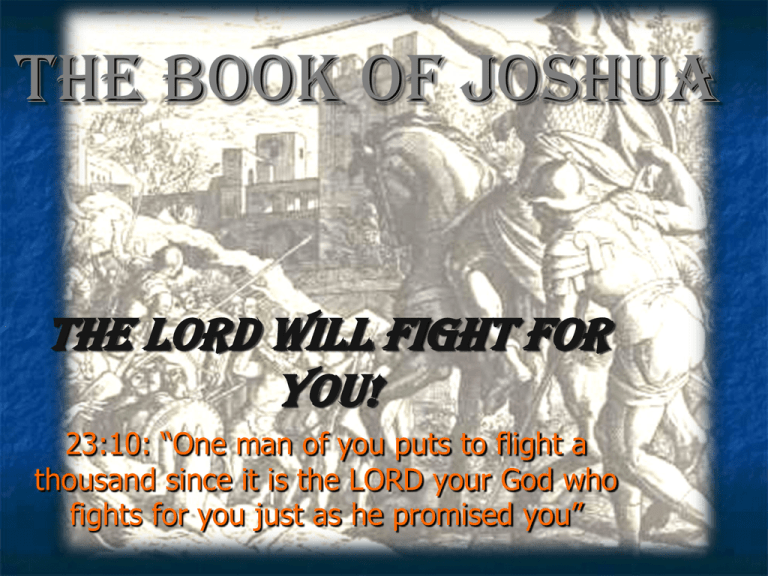
The Book of Joshua The Lord will fight for you! 23:10: “One man of you puts to flight a thousand since it is the LORD your God who fights for you just as he promised you” INTRODUCTION 1. The HISTORICAL SETTING a. b. Historical Scope: about 20 years As the book of Joshua begins: 1. 2. c. Where is the nation of Israel? On the east side of the Jordan river What is the basic spiritual condition of the nation? Bold and courageous: they are a new generation! The twofold responsibility God sets before Joshua 1. 2. To destroy the population of the land To divide and inhabit the land INTRODUCTION 2. Outline of Joshua I. Entering the Land of Canaan (1-5) II. Conquering the Land of Canaan (6-12) III. Dividing the Land of Canaan (13-22) IV. Joshua's Final Charge to Israel (23-24) INTRODUCTION 3. Purpose of Joshua To display God’s power by giving Israel the promised land, thereby dividing it equally among the tribes, and to reaffirm his covenant with the new generation. INTRODUCTION 4. The “Former Prophets” (or “Historical Books”) Hebrew Bible (Former Prophets) English Bible (Historical Books) Joshua Judges Samuel (both 1 and 2) Kings (both 1 and 2) Joshua Judges Ruth 1 2 1 2 Samuel Samuel Kings Kings 1 Chronicles 2 Chronicles Ezra Nehemiah A. Joshua is commissioned by YHWH (Josh 1) several themes laid out in 1st chapter 1. Divine sovereignty (1:2-5; 24:1-13) 2. Human responsibility (1:6-9; 24:14-15) 3. Tribal Unity (1:10ff; cf. ch. 22) 4. Leadership 1. 2. 3. Leaders in Judges? Prophecy of a leader in Ruth Leaders in Samuel? Overview B. Jericho is spied out (2) a. Theological Significance of Rahab? First significant non-Israelite to express faith in Israel’s God Cf. Gen 12:3 “through you all the nations will be blessed” God’s intention is to reach the nations through Israel (not reach Israel instead of the nations). b. inclusion of “outsiders/nations” in Joshua OVERVIEW C. The nation of Israel crosses the Jordan River (3-4) Clearly, the ark and priests are the focus. What’s the point? Power of God emphasized: 3:9-13; 4:5-7; 4:21-24; 5:13-1 The power of having a “God-with-ness” Evokes the Exodus The "Captain of the Host" appears to Joshua (5:13-15) What is the theological point being established? God will fight for the Israelites if they obey, and against the Israelites if they don’t obey (i.e. treat Him as holy) The Three Campaigns of Joshua 1. 2. 3. Central campaign (Josh 6-8) 1. Jericho 2. Ai Southern campaign (Josh 9-10). triggered by the treaty with Gibeon. Northern campaign (Josh 11). Jabin of Hazor assembleS a large army for war. The conquest of Jericho (Josh 6) 1. 2. 3. 4. Small city God’s the one fighting The walls fell “flat” (lit. “in its place”) Test of obedience (Josh 6:18-19) The conquest of Ai (7:18:29) Achan contrasted with Rahab Why the severe punishment of Achan Kherem regulation (kherem = “under the ban” or “devoted to destruction”) Ma’al (“break faith”) Corporate solidarity (Achan) The Battle (ch. 8) “God works through miracle; God works through human planning and strategizing” (Hamilton, 44) SOUTHERN campaign (9-10) Deut 20:10-12, 15-16, “When you approach a city to fight against it, you shall offer it terms of peace. And it shall come about, if it agrees to make peace with you and opens to you, then it shall be that all the people who are found in it shall become your forced labor and shall serve you…Thus you shall do to all the cities that are very far form you, which are not of the cities of these nations nearby. Only in the cities of these peoples that the LORD your God is giving you as an inheritance, you shall not leave alive anything that breathes” The NORTHERN Campaign (11:1-15) a) b) Not much “ink” for the northern conquest Did Joshua and the Israelites Conquer the Land or Not? Comprehensive defeat? (i.e. “No one left standing”) (11:23; Josh 21:43-45; 23:14) No comprehensive? (Cf. 13:1-2; 16:10; 17:12-13; 18:2-4 [Judges 1-2]) Historical hyperbole. III. Dividing the land of Canaan (13-22) Significance of the land division? The fulfillment of God’s Land Promise (Gen 12:1-3) Complete fulfillment? 1. 2. 3. 4. Different views on Land fulfillment Literal Fulfillment in Joshua. Spiritual Fulfillment in Jesus Literal fulfillment in 1948. Partial Fulfillment in Joshua, complete fulfillment in all creation at the end of time. Joshua's Final Charge to Israel (23-24) a) 24:1-28: God’s sovereignty and human responsibility a) b) 24:1-13 = past indicative of what God has done for them a) cf. 23:10: 24:14-15 = imperative flowing from God’s great act a) Cf. 23:11-12 Excursus: The Ethics of “Holy War” 4. Common grace extended to the Canaanites (Gen "Have I not commanded you? Be 15), and some responded to this grace (i.e. Rahab; cf. strong and courageous. Do not be Gibeonites) terrified; do not be discouraged, for the LORD your God will be with you Divine punishment, wherever not “ethnic you go”cleansing” (D. Rumsfeld, 3 April 2003 in reference to America's invasion 1. “There is a huge moral difference between arbitrary of Iraq) violence and violence inflicted within the moral framework of punishment” (Wright, OT Ethics, 476) 2. Capital punishment vs. random murder Fulfillment of a covenant promise, not arbitrary killing God’s people as a theocratic nation 5. OT as an unfolding drama 1. 2. 3.


